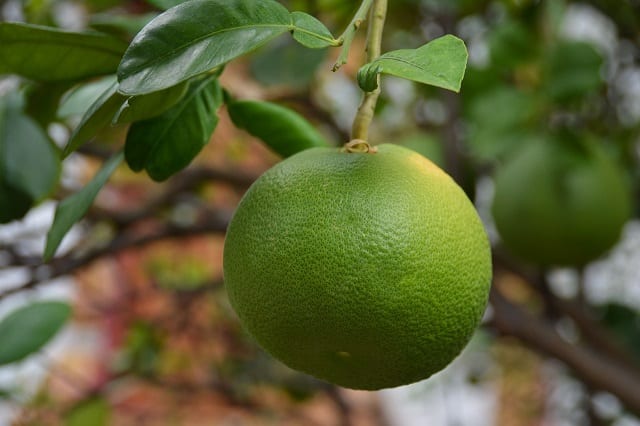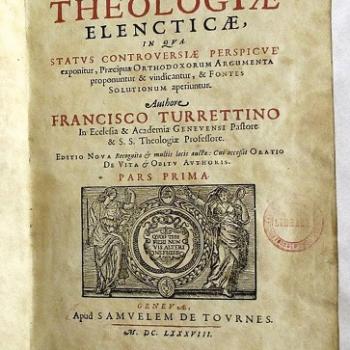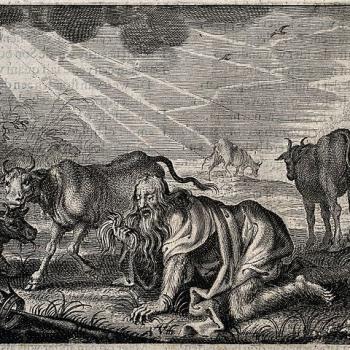
Ward Ricker is an atheist who (as so often) was formerly a self-described “fundamentalist”. He likes to poke holes in the Bible and “prove” that it is a terrible and “evil” book, not inspired, hopelessly contradictory, etc. He put together a 222-page book called Unholy Bible (2019): available for free as a pdf file. It contains 421 couplets of passages that he considers literally contradictory, and 256 more couplets of not technically contradictory but “problem” passages (according to him). Ward wrote in his book: “I . . . am including here only what I consider to be the more firm examples of contradictions. . . . I do not want to include examples that are ‘weak’ and will be easily refuted. I have made my best judgment.”
He issued a challenge for anyone to take on his alleged contradictions. After my first reply, he wrote a 5 1/2 page article suggesting in-depth dialogue. I responded, explaining in depth why I thought dialogue between us would be unfruitful, for many reasons. He then accused me (among other things in his two replies) of “hypocrisy” that “knows no bounds.” This is, of course, against my discussion rules, which forbids such rank insults, so he was promptly banned from my blog, and I replied: “I was exactly right in my judgment that no dialogue was possible. It never takes long for the fangs to come out if they are there.”
But I had already stated: “I may still take on several of your proposed contradictions, just so I can have opportunity to show how very wrong atheist contentions are (which is one thing Christian apologists do).” This series represents that effort. Mr. Ricker can respond on his page as he sees fit. He can still see my posts. His words will be in blue. To search any of this series on my blog, paste “Ward’s Whoppers #” in the search bar on the top right of my blog page. He uses the King James Version for his Bible verses. I will use RSV in my replies.
*****
4.
Genesis 1: 29 And God said, Behold, I have given you every herb bearing seed, which is upon the face of all the earth, and every tree, in the which is the fruit of a tree yielding seed; to you it shall be for meat.
Vs:
Genesis 2: 16 And the LORD God commanded the man, saying, Of every tree of the garden thou mayest freely eat: 17 but of the tree of the knowledge of good and evil, thou shalt not eat of it: for in the day that thou eatest thereof thou shalt surely die.
Q: Were Adam and Eve allowed to eat from any tree in the garden of Eden?
This is an example of an alleged “contradiction” which simply (plainly / evidently) is not one according to the rules of logic: the very sort that Ward claimed he did his best to avoid in his book (and I assure my readers that I will surely find many of these before I am done analyzing this book; and he will lament and regret the day he ever challenged me to do so):
[W]hat would seem to be a contradiction may not necessarily be so. . . . Sometimes what people will often call a contradiction is not truly a contradiction. (p. 45)
[M]any Bible critics (“atheists” or otherwise) will use some pretty ridiculous arguments . . . But the fact that some people get carried away and make false claims doesn’t invalidate the claims that are correct. And the fact is that there are a large number of clear contradictions in the so-called “inerrant word of god”. I have screened out those bogus claims that some critics make and have published my own book . . . of contradictions that I and others have found in the Bible that are clearly contradictions. (letter to National Catholic Register about one of my articles there; reproduced in my first reply)
Ward must not have had his logic cap on the day he decided to include the above “contradiction” in his list of 421. Genesis 1:29 restricts the sort of trees for human consumption to those bearing “seed” in their “fruit”. Here are some other major translations:
NASB . . . every tree which has fruit yielding seed; it shall be food for you;
NIV . . . every tree that has fruit with seed in it. They will be yours for food.
NKJV . . . every tree whose fruit yields seed; to you it shall be for food.
RSV . . . every tree with seed in its fruit; you shall have them for food.
NRSV . . . every tree with seed in its fruit; you shall have them for food.
Genesis 2:16 notes one exception to the trees that may be eaten. Thus, the two passages do not contradict, since, logically, all one has to say is that the tree of the knowledge of good and evil (whether envisioned as literal or metaphorical: and I favor the latter) was simply not one of the trees that bears seed in its fruit. This isn’t complicated. It only is when one approaches the Bible (as I have always said atheists do) like a butcher approaches a hog.
To verify that such “seedless” trees, or trees that don’t bear fruit at all, do indeed exist, I consulted a website on “beginner gardening”:
Several trees in the Fraxinus genus are seedless, including the “Raywood” ash (Fraxinus angustifolia “Raywood”), a 35-foot-tall deciduous tree . . . Another seedless ash, the “Rosehill” white (F. americana “Rosehill”) is similarly adaptable but grows to 65 feet tall. . . . The “Marshall” seedless green ash (F. pennsylvanica “Marshall”) is hardy in USDA zones 4 to 9 and grows to 50 feet tall. . . .
The “Autumn Gold” maidenhair tree (Ginkgo biloba “Autumn Gold”) does not produce fruit. . . .
In the Olea genus, the “Swan Hill” European olive (O. europaea “Swan Hill”) does not bear fruit. . . .
The Fraser photinia (Photinia x fraseri) . . . doesn’t bear fruit. . . . A cultivar of a California native, the “James Roof” silktassel (Garrya elliptica “James Roof”) is a seedless evergreen that grows to 25 feet tall.
One nurseries and landscaping page noted several seedless varieties of maple trees alone (no “helicopter seeds” littering your lawn):
Fast growing and colorful hybrid maple varieties that are seedless include ‘Celebration’, ‘Sienna Glen’ and ‘Firefall’. Red Maple varieties known to be seedless include ‘Autumn Radiance, ‘Northwood’, ‘Sun Valley’, and ‘Autumn Spire’.
The same larger web page mentions additional seedless trees in another article:
Other good hardy seedless or mostly seedless shade trees include Espresso Kentucky Coffeetree, his Majesty Corktree, Skyline, Sunburst and Northern Acclaim honeylocust.
Clearly, then, there are many such trees. This is a ridiculous and absurd example of an alleged contradiction. Even the statement of what is supposedly contradictory; by the way, echoing what the devil said in Genesis 3:1 (“Were Adam and Eve allowed to eat from any tree in the garden of Eden?”) — my italics – is immediately self-defeating, since it (polemically) presupposed that Genesis 1:29 was referring to eating any and all trees, when in fact, the passage plainly limited such trees to those which bore seed.
Someone might retort that the tree of the knowledge of good and evil did indeed produce fruit, that Eve and then Adam both ate (Gen 3:2-3, 6, 12-13) in disobedience to God’s commands (so that they were not of the sort of tree that had no fruit). But this objection would neglect to see that Genesis 1:29 refers to fruit that contains or yields seed. Again, there are many fruits (or certain types of individual fruits) that grow on trees which do not contain seed in them: such as bananas, oranges, lemons, and limes.
Note also that the Bible never says that the forbidden fruit was an apple. That is simply presupposed, and has become the non-biblical “legend.” The Bible merely describes it as “fruit.” Therefore it could have been a fruit without seed, which was precisely the sort that God said not to eat, in Genesis 1:29. Conclusion? No contradiction at all . . .
Ward — poor fellow — miserably fails to come off looking like the “smart / scientific” atheist over against the alleged “dumb / ignorant / anti-scientific” Bible and Christians (i.e., of the sort that he himself used to be).
***
Photo credit: terimakasih0: lime from a lime tree. Limes usually don’t have seeds [Needpix.com]
***













